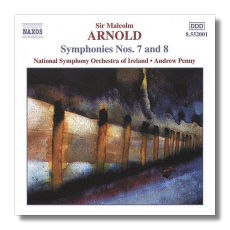
The Internet's Premier Classical Music Source
Related Links
- Arnold Reviews
- Latest Reviews
- More Reviews
-
By Composer
-
Collections
DVD & Blu-ray
Books
Concert Reviews
Articles/Interviews
Software
Audio
Search Amazon
Recommended Links
Site News
 CD Review
CD Review
Malcolm Arnold

Symphonies #7 & 8
- Symphony #7, Op. 113
- Symphony #8, Op. 124
National Symphony Orchestra of Ireland/Andrew Penny
Naxos 8.552001
I've been following this series of the complete symphonies – half of it anyway – with considerable interest, and reviewed Symphonies 5 and 6 for another publication. Arnold is an extremely intriguing composer who turned eighty in 2001. He ought to be better known – but I don't know how many times I've written that about unjustly neglected composers. Some will say that Arnold is hardly neglected any more, since there are two complete cycles of his symphonies currently available (the other on Chandos) and much of his remaining output also on record.
His Symphony #7, while little of it sounds like Vaughan Williams, reminds me of that composer's angry and intractable Fourth Symphony, and to some extent his Sixth. The Seventh's first movement features intense, driving rhythms, raging brass, dark jazzy episodes and a sense of something dreadful lurking around the corner. This is one of the most powerful and unsettling symphonic movements in the 20th century, but may be held back from wider currency by its focus on atmosphere and conflict, and its eschewing of memorable melody. The ensuing andante is a bit less disturbing but still features the lingering tensions from the opening panel. Its often mechanical-sounding character – owing largely to the percussion and, at the end, cowbells – give it a weird, primitive cast of brilliant imagination. The finale is a bit less grim than either of the first two movements, but doesn't quite emerge from the darkness and violence. It's creepy and atmospheric, especially in the soft string writing midway through. Some colorful, lively Irish folk-like music in the latter part doesn't so much brighten the mood as suggest disturbing hallucination. The powerful cow-bell close crowns the work with what seems a warning.
The Eighth isn't as dark but still has its moments of thunder and is nearly on the same level with the Seventh, probably my favorite Arnold Symphony. Both works are cast in three movements, with the thirty-eight minute Seventh lasting twelve minutes longer in Penny's somewhat expansive interpretation. The National Symphony Orchestra of Ireland seems to get better with each recording Naxos issues. This is their best work thus far – you could mistake them for a first-tier ensemble here, and maybe they are now. Andrew Penny leads these symphonies with authority and a sense for Arnold's darker side. Highly recommended!
Copyright © 2002, Robert Cummings




















